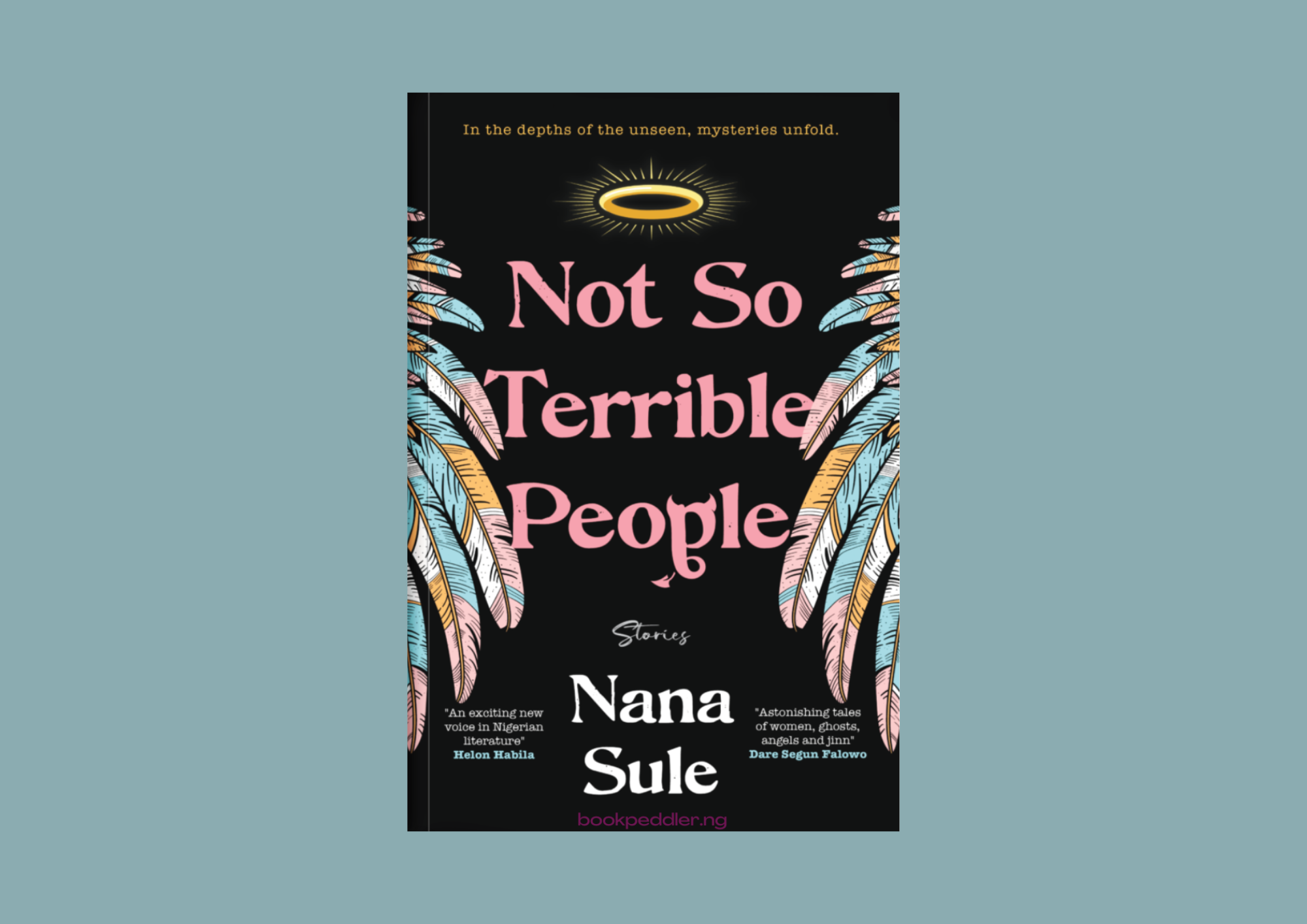I found myself entranced as I closed the cover on Nana Sule’s debut short story collection “Not So Terrible People”. The book cast a spell on me from the very beginning, leaving me unable to put into words the surreal dimension the book had transported me to. The intricate interweaving of stories, oscillating between past, present, and future, the seen and the unseen, the ordinary and the supernatural, left me breathless. I was drawn into a realm where logic and mystery coexisted, where the relatable and the unknown blended seamlessly.
What’s the Scoop?
The book’s opening chapter, narrated by Amal in a conversational first-person POV, made a haunting case to an angel of death, resonating deeply with my own Islamic beliefs surrounding death, burial rites, and the questioning in the grave. But it was the second story, “Owanyi”, that truly hooked me. The complex background and the torn-apart emotions I felt for the man who had built his hopes around this breathtakingly beautiful woman, only to discover she was not-so-human, stayed with me long after I finished reading.
As I journeyed through the stories, I found myself connecting with the characters on a profound level. The chapter on Ohunene, linked to Rahila, Ometere, and Ozovehe, peeled back the layers of human relationships – love, betrayal, and selfishness. I saw myself in Abdul’s character, navigating the complex emotions around his wife’s betrayal and callousness, and his uncompromising stance in rekindling their relationship.
The supernatural elements added a rich layer to the narrative. In the culmination of chapters, particularly “Bilya”, “Malaika”, “Ozovehe”, “Rahinat”, “Oyiza”, and “Laila”, I was transported to a world where angels, jinns, and other creatures surrounded humanity, often unbeknownst to us. The mad man who turned out to be an angel in human form, Bala the jinn leading prayers in the mosque, and Laila, a human with the supernatural gift of seeing souls, all added to the richness of the narrative.
One of the most striking aspects of the book is its subtle details, which allow readers to connect the dots and piece together the larger narrative. The theme of forgiveness, particularly in the chapter “Malaika”, raises important questions about humanity and repentance. The chapter “Ometere” was particularly poignant, highlighting the desperate desires of women to stay married and the unspeakable things they might do as a result.
The satisfaction I felt when Laila killed the pedophile who violated her as a girl was palpable. It was a testament to the book’s ability to evoke strong emotions and spark important conversations. “Not So Terrible People” is a masterpiece that will leave you questioning the boundaries between the ordinary and the supernatural, and the complexities of human relationships – a thought-provoking read that will refuse to leave you long after you finish the book.
A Soul-Stirring Masterpiece
Perfectly Paced: At 159 pages, this book flew by too quickly! The author’s skillful storytelling left me craving more, a testament to their ability to captivate and enthrall.
What I Loved About This Book?
The Nigerianness: I was thoroughly entertained by the diverse cast of Nigerian characters, each with their unique tribal accents and quirks. Ebuka’s voice had me giggling, especially when he affectionately referred to Owanyi as “Sweet’im” – that Igbo charm, though! And let’s talk about the hilarious moment when Owanyi got yelled at with “Ah! You want to die ni?” – I was like, “Yoruba Land, here we come!” The author’s masterful use of dialects and accents added a layer of authenticity that made the characters feel so familiar. It’s clear that the author knows their onions when it comes to Nigerian cultures, and it shows in their writing.
Complex Characters and Relationships: The stories expertly peeled back the layers of human relationships, revealing complex layers of love, betrayal, selfishness, envy, and rivalry. I deeply resonated with Abdul’s emotional journey.
Supernatural Elements: My absolute favorite aspect! The supernatural elements added a rich, exciting layer to the narrative, featuring angels, jinns, and other creatures that surround humanity. I’m now hooked on this genre!
Emotional Resonance: This book evoked a rollercoaster of emotions, leaving me invested and moved. From the poignant moments of Laila’s past to the satisfying justice served, the devastating toll of loss on Ebuka after finding out that the love of his life was not-so-human afterall, the shattering revelation of Abdul’s wife’s betrayal, and the thought-provoking exploration of family dynamics through Oyiza’s POV… all these elements combined to create an emotional and impactful reading experience.
Narrative Depth: The subtle details throughout the book allow readers to piece together the larger narrative, adding depth and complexity to the collection.
A Minor Quibble I Had?
While I thoroughly enjoyed the book, Amal’s chapter felt somewhat disconnected from the rest of the book. I found myself wondering how the supernatural elements that were woven throughout the other chapters tied into Amal’s story. I was also curious to know more about Alhaji’s backstory and how it might have impacted the other characters. I was low-key expecting chapters linked to Alhaji’s past and his connections to the supernatural world, Plotlines that would protect Rhoda from potential harm and Justice being served to those who wronged Amal.
Trigger Warning
Rape
Sexual Assault
My Rating: 4.9/5
It was an exciting read! Nana Sule’s “Not So Terrible People” is a mesmerizing ride that will open your eyes to the multidimensional realities of our human existence, leaving you questioning the boundaries between reality and the supernatural.
Wardah Abbas
Wardah Abbas is a lawyer, writer and women's rights advocate. She has been published in various magazines, journals, media platforms and anthologies. Her writings focus mainly on gender, culture, Islam and the complexities of being human. She is the founding editor of The Muslim Women Times - A media platform and community centring the diverse perspectives of Muslim Women.


